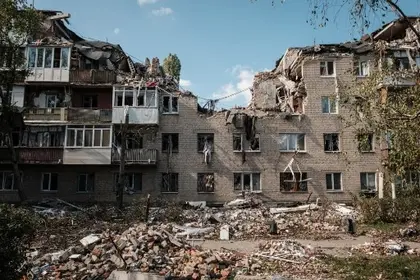Days are spent under a hail of shells, and night brings no respite for Ukrainian soldiers as enemy forces draw ever closer in Bakhmut, one of the last towns where Russian troops are still advancing.
The metallic boom of shelling echoes across the hills surrounding the small town, home to 70,000 people before the war.
JOIN US ON TELEGRAM
Follow our coverage of the war on the @Kyivpost_official.
Russia has been falling back in its offensive — but in Bakhmut, unlike across most of the front line, Ukrainians are on the defensive.
They face the “most difficult” challenges, President Volodymyr Zelensky said this weekend.
Ukrainian troops still control the northern and western parts of the city, AFP journalists saw on Saturday, Oct.15.
Metal crosses and blocks of concrete mark the Ukrainian front line, dubbed “point zero”. No one is allowed past.
Around it, in the “grey zone”, Russia is on the offensive.
Pro-Russian separatist forces have pressed ahead east and south of Bakhmut, relying on their base in the city of Donetsk about 100 kilometres (62 miles) away.
On Thursday, they said they recaptured two neighbouring villages, Opytine and Ivangrad.
Close combat
The retaking of the two villages raised fears that Russian forces, including Wagner paramilitary units, may have infiltrated the eastern part of the city, according to a British intelligence note.
On the ground, Ukrainian soldiers told AFP there was now close combat with members of pro-Russian forces.

‘Enough of Fico, Glory to Ukraine’ – Ukraine at War Update for Dec. 24
Enemy troops “start when night falls. They send their reconnaissance units around 6 pm,” said one soldier who uses the nom de guerre “Poliak”.
In a bitter tone of voice, the 50-year-old from the 93rd brigade said inexperienced, “single use” soldiers are sent into the line of fire to “divert” attention from more experienced units carrying out sabotage.
“Between then and 5 am, we get about seven or eight (diversion) attacks like that,” he explained.
Poliak recently suffered a minor shrapnel injury and returned exhausted from the most intense of the fighting.
After four sleepless nights, the former truck driver said he experiences “hallucinations” from the stress and fatigue.
One evening, his unit opened fire, thinking they could see a Russian commando through night-vision goggles.
Early in the morning, they realised they had been shooting at a pile of logs.
The unit has since been given some rest. Of its 13 men, five were injured, and two never came back.
Lost purpose
Every building in the Ukrainian-controlled centre of Bakhmut bears the marks of two months of intense combat.
Windows of the buildings still standing have been smashed, and rooves have been ripped off.
Civilians live in their basements, taking great risks as they search for food, water, fuel, fresh air, or power from communal generators.
There is no running water in Bakhmut, and electricity was completely cut off ten days ago.
Miraculously, the phone network is holding up.
People stock up on food at the market, where a few items are laid out on wooden planks.
An 80-year-old woman stood in a state of shock in the streets, holding a pipe for her wooden stove.
“We cannot even bury people anymore,” she said.
“My sister has been under the rubble (after a strike) overnight on October 12-13. No one can come get her body. I just wander about, without any purpose. I do not know where to go,” the former beekeeper said.
“My bees are somewhere in the forest, left to fend for themselves. And we are left fending for ourselves too,” she said, bursting into tears.
You can also highlight the text and press Ctrl + Enter






